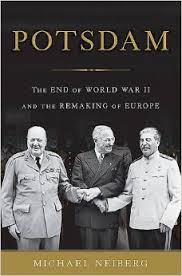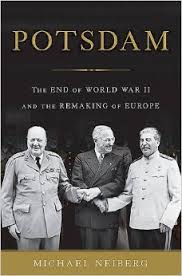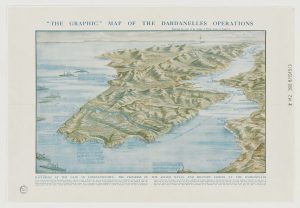
Finest Hour 169
Books, Arts, & Curiosities – The End of the Affair

November 10, 2015
Finest Hour 169, Summer 2015
Page 45
Review by Alonzo Hamby
Alonzo L. Hamby is Distinguished Professor Emeritus of History at Ohio University and author of Man of the People: A Life of Harry S. Truman, published in 1995 by Oxford University Press.
Michael Neiberg, Potsdam: The End of World War II and the Remaking of Europe. New York: Basic Books, 2015. Pp. xiv, 310, $29.99.
ISBN 978-0465075256

2025 International Churchill Conference
 Perhaps the most impressive achievement of Michael Neiberg’s absorbing book is its description of what the Germans now call Stunde Null (“Zero Hour”). At the end of World War II, much of Germany was in ruins and in a state of social and political collapse, nowhere more so than in the eastern region, overrun by a Red Army that destroyed almost everything in its path and pursued a sanctioned campaign of rape. Much of what remained—from works of art to railroad rolling stock—was systematically looted as “war booty” by the Soviets, who claimed that their expropriations should not be counted against the reparations the Germans would have to pay. Berlin was a vast pile of rubble, but its most famous upscale suburb, Potsdam, had been largely bypassed. It was here that the Big Three leaders of the victorious Allies—Winston Churchill, Harry Truman, and Joseph Stalin—staged the final summit meeting of the global conflict and, however unwittingly, laid the basis for a nascent Cold War.
Perhaps the most impressive achievement of Michael Neiberg’s absorbing book is its description of what the Germans now call Stunde Null (“Zero Hour”). At the end of World War II, much of Germany was in ruins and in a state of social and political collapse, nowhere more so than in the eastern region, overrun by a Red Army that destroyed almost everything in its path and pursued a sanctioned campaign of rape. Much of what remained—from works of art to railroad rolling stock—was systematically looted as “war booty” by the Soviets, who claimed that their expropriations should not be counted against the reparations the Germans would have to pay. Berlin was a vast pile of rubble, but its most famous upscale suburb, Potsdam, had been largely bypassed. It was here that the Big Three leaders of the victorious Allies—Winston Churchill, Harry Truman, and Joseph Stalin—staged the final summit meeting of the global conflict and, however unwittingly, laid the basis for a nascent Cold War.
Mr. Neiberg, who holds the Henry L. Stimson Chair of History and Security Studies at the Army War College, attempts a rough analogy between the Potsdam meeting and the post-World War I Versailles conference, which had redrawn the map of Europe. It does not quite work. Versailles was a three-and-a-half month slog that produced a formal peace treaty and established an international organization, the League of Nations. In July 1945, the birth of a successor organization, the United Nations, was already moving along separately and satisfactorily. Most of the discussion at Potsdam was about matters already agreed upon at the Yalta conference—zones of military occupation, reparations, Soviet entry into the war against Japan. Why, one might wonder, could the details not be handled by a council of foreign ministers?
Part of the answer, no doubt, was simply the temptation to indulge in a victory lap on the enemy’s turf. Churchill, with an election in the offing, surely felt it most strongly. Stalin, loath to step outside the boundaries of the Soviet Union and determined always to remain within areas of Soviet control, was notably lacking in enthusiasm. Truman, still coping with his adjustment to the presidency upon Roosevelt’s death, 12 April 1945, was reluctant. But the wartime summit meetings at Casablanca, Teheran, and Yalta, along with face-to-face meetings between Churchill and Stalin, had compromised the authority of foreign ministers. The leaders at the top needed to take the measure of each other.
Potsdam met a second need. With victory approaching, the Grand Alliance was beginning to fray. Truman was a largely unknown quantity to both Churchill and Stalin. Taking pledges to establish independent democracies in Eastern Europe seriously, he had already clashed with Soviet Foreign Minister Molotov. In the final weeks of the war, Churchill had privately urged the president to keep the US military offensive moving east of the Elbe into what was to be the Soviet occupation zone. Believing that the obligation to observe prior agreements was a two-way street, Truman had refused to do so.
What did the conference itself achieve? For the most part, it simply ratified facts on the ground and reaffirmed understandings taken at Yalta. The borders of Poland would be redrawn in a way that would allow the Soviet Union to retain the Polish territory it had acquired via the Molotov-Ribbentrop pact of 1939, and Poland would be compensated with German land to a line established by the Oder and Neisse rivers. (The author admits a rough justice here; much of the area Poland lost was primarily Ukrainian in population, seized by the aggressively expansionist new nation after World War I.) The USSR would proceed in its effort, already well along, to establish a government dependent on Moscow in the new Poland. Zones of military occupation agreed upon in 1944 would be observed, the US and UK carving from their own zones areas of French control. The lack of agreement on reparations led to an understanding that each occupying power would extract reparations from its own zone. The effect, not understood at the time, would be to partition Germany into distinct western and eastern states.
Truman was most concerned with achieving a reaffirmation of the Soviet pledge, made at Yalta, to enter the continuing war against Japan in return for territory lost in the Russo-Japanese war of 1904–05 and effective dominance of Manchuria. (He had received word of the successful test of the atomic bomb in the New Mexico desert, knew that it was a weapon of unprecedented impact, but probably did not grasp its full potential. When he told Stalin that the United States had just tested “a new bomb of extraordinarily destructive power,” the Soviet leader, who knew about the atomic project from his spy network, simply responded that the US should make good use of it. Privately, he may have seen it as an attempt at intimidation.) The USSR, formally still neutral, joined in a “Potsdam Declaration” that threatened “prompt and utter destruction” if Japan did not surrender. It would in the closing days of the war overrun Manchuria and claim its share of the spoils in East Asia.
The three delegations at Potsdam all left satisfied with the results and believing they had established the conditions for a relatively amiable period of stability in world politics. The biggest individual loser was Churchill, defeated in the British election and succeeded in the closing days of the conference by Clement Attlee, who, Neiberg reminds us, was more than Churchill’s caricature of him as a man who “has much to be modest about.” Still, he lacked Churchill’s stature and experience. It did not take a lot of foresight to see that Britain was a declining power that would be unable to maintain its empire, that the Soviet Union was emerging as a major global force, and that Harry Truman’s United States was the only possible counterweight. Potsdam set the stage for a new world of bipolar conflict.
Subscribe
WANT MORE?
Get the Churchill Bulletin delivered to your inbox once a month.




